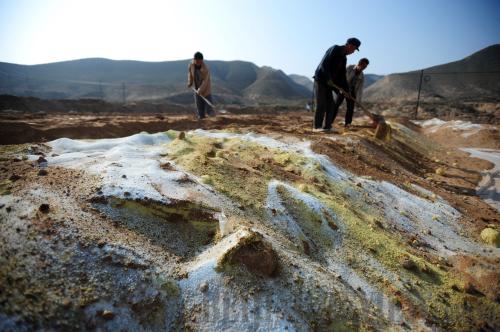|
 |
|
LAND RECOVERY: Workers decontaminate heavy metal-laden soil in Baiyin, Gansu Province, on October 16, 2011 (NIE JIANJIANG) |
Earlier media reports also revealed that because individual citizens and non-governmental organizations (NGOs) do not have the right to initiate class action lawsuits against polluters, the dozens of environmental courts in China have almost no cases to process. In the meantime, environmental pollution continues to worsen in the country.
In a most recent environmental emergency on April 11, more than 2.4 million residents in Lanzhou, capital of northwest China's Gansu Province, were affected when excessive levels of benzene, a carcinogenic chemical, was found in the city's tap water supply. The pollutants were later confirmed to have leaked from a pipeline belonging to Lanzhou Petrochemical, a subsidiary of China National Petroleum Corp., the country's largest oil company.
Five residents in Lanzhou tried to suing Veolia Water Corp., the main water supplier in the city, for failing to guarantee its water quality and providing unsafe water after the incident. However, a local court refused to accept the case on the grounds that as individuals, the five people did not have the right to file the lawsuit.
Meeting public expectations, the new Environmental Protection Law allows class action lawsuits on environmental issues and expands the range of subjects for such litigations.
Zhai Yong, head of the Law Chamber of the Environmental Protection and Resources Conservation Committee of the NPC, said that legislators had debated over which organizations should be eligible to file class action lawsuits against polluters.
The new law lists three specific requirements for NGOs to be eligible for class action suits: They must have been registered with civil affairs departments of governments at city level or above over the past five years; they must prove they have been engaged in protecting the environment for more than five years and they must have good reputations.
Courts should receive class litigations on environmental issues in accordance with the law, while NGOs should not seek to profit through such litigations, the new Environmental Protection Law states.
"The change may raise the number of qualified organizations from less than 100 to several hundred," said Ma Yong, Director of the Supervision and Litigation Department at the Environmental Legal Service Center of the All-China Environment Federation, one of the most active organizations in the field of environmental class action lawsuits.
By promoting class litigations, environmental activists hope that the public's desire for a better environment can be addressed through the rule of law, instead of resorting to protests.
China has faced an increasing number of protests, sometimes referred to as "mass incidents," over environmental issues in recent years. A few cities have seen residents take to the streets against petrochemical projects, which they believe are a major threat to the environment and public health. In most of the cases, the projects in question were later suspended.
In a recent case, more than 1,000 people took to the streets in Maoming, a major Chinese petrochemical production base in south China's Guangdong Province, to protest against a paraxylene (PX) project in late March. PX is used for making a number of polyester products.
The PX project was approved in 2012 with an annual production capacity expected to meet 600,000 tons.
While hailing the new legislation as progressive, experts admit that difficulties remain.
"The requirement that qualified environmental organizations must have been registered with civil affairs departments for more than five years may be very hard to reach for many organizations because the registration procedure has been open nationwide for less than two years," said Yang Sujuan, Deputy Director of Environmental and Natural Resources Law Research Institute with the China University of Political Science and Law.
"To get involved with such lawsuits, an organization needs to have a professional team, including not only legal experts but also chemists," said Ma with the All-China Environmental Federation. "They may also need to be prepared to spend three to five years on one case."
Ma expects the number of environmental class action lawsuits across the country to increase after the new Environmental Protection Law is put into effect, but added that the total would not soar dramatically because "not many would be willing to spend such a large amount of money and time doing something as painstaking as this."
However, Yuan with the Legislative Affairs Commission of the NPC Standing Committee said that the standard has been set following international practices.
"Environmental class action lawsuits must be handled by professionals because relevant evidence is hard to collect. The prosecution must be familiar with environmental issues and have good social credibility," Yuan said.
Email us at: yinpumin@bjreview.com | 